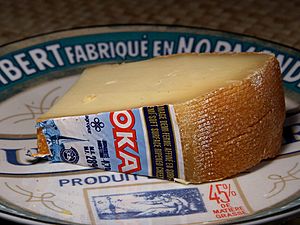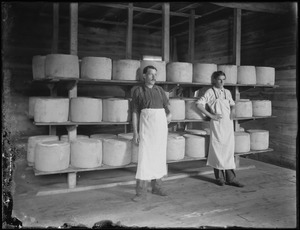Canadian cheese facts for kids

Cheese has been made in Canada for a very long time! It all started when Samuel de Champlain brought cows from France in about 1608 or 1610. The Canadienne cattle breed might even be related to these first cows. Early French settlers made soft, fresh cheeses, like those from France. Later, British settlers and people moving from the American Revolution brought their own cheese styles, such as Cheddar.
How Cheese Factories Started
For many years, cheese was mostly made on farms in Canada. But in 1864, an American named Harvey Farrington started buying large amounts of milk. This helped create the first commercial cheese factory, called "The Pioneer," in Norwich, Ontario.
Around the mid-1800s, a problem with wheat midge insects caused many farmers in Ontario to switch to dairy farming. Making cheddar cheese became their main product to sell to other countries, especially England. This was before electric fridges were invented! In 1867, the year Canada became a country, 200 new cheese factories opened in Ontario alone.
In 1881, Édouard-André Barnard opened North America's first cheese-making school in Saint-Denis-De La Bouteillerie, Quebec. Another dairy school opened in 1892 in Saint-Hyacinthe, Quebec. By the early 1900s, there were 1,242 cheddar factories in Ontario. Cheddar became Canada's second biggest export, after timber.
However, by 2012, Canada was buying more cheese from other countries than it was selling. A processed cheese product called "Kraft Dinner" (macaroni and cheese) became super popular.
Canadian Cheese Today
Canadian cheeses are grouped into six main types based on how much moisture they have. These types are firm, soft, semi-soft, fresh, blue-veined, and hard. Most cheeses you find are firm, soft, or semi-soft.
Today, Canada makes over 1,050 different kinds and brands of cheese! More than half of all cheese makers are located in Quebec. There's even an annual competition for Quebec cheeses called Sélection Caseus, which started in 1999. It gives out gold, silver, and bronze awards every year.
Quebec's Cheese Story
Cheesemaking really grew in Quebec in the late 1800s. At that time, people in Quebec didn't eat cheese very often because they thought it was a luxury. For a while, Quebec cheese didn't have a great reputation in Britain. So, in 1892, Quebec started a special program to show that its cheeses were just as good as those from Ontario. Even during World War I, Quebec cheese was sometimes sold in the United Kingdom as if it came from Ontario.
Joseph-Édouard Caron, who was the minister of agriculture in the early 1900s, set up rules for inspecting cheese and butter factories in Quebec. This helped improve the quality.
By 2013, about 700 different kinds of cheese were being made in Quebec by over 100 cheese makers. Quebec saw a big increase in cheese making between 2001 and 2008, with many new cheese makers opening their businesses.


